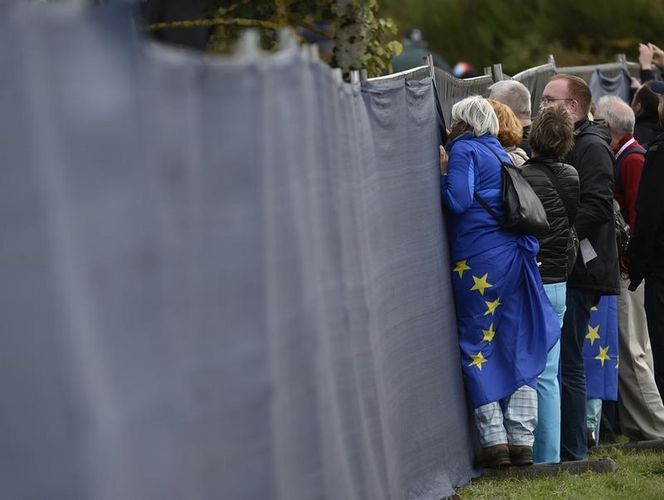While most of us in the UK spent the weekend being good little Europeans, waving our blue and gold flags whilst humming the opening bars of the 4th movement of Beethoven’s 9th, and while “our” golfers were giving their American peers a thoroughly good drubbing as well as a lesson in team performance, our French neighbours were making their views known in elections to the Senate. They saw the far right Front Nationale under the leadership of Marine Le Pen capture its first ever two seats.
The process of nomination and election to the Senate is complex and not entirely representative. It involved in this case half of the 348 Senate seats and was carried out by an electoral college of around 87,000 city councillors and local leaders. What became of the socialist candidates I barely need to report given that President Francois “Qui? Moi?” Hollande is sporting a popularity rating of no more than 13%.
Not surprisingly, the two newly-elected FN senators represent southern constituencies where the sense of alien assault on the Judeo-Christian traditions is at its keenest. This all comes as the German eurosceptic party, the AfD, has just been reported to be polling 8% and when here in the UK the governing Conservatives, who are in the midst of their annual conference, are experiencing defections of sitting MPs to the equally eurosceptic UK Independence Party (UKIP).
Although I personally have absolutely no truck with these movements, it is easy to understand that, in a world where the likes of Al Qaeda, Boko Haram and ISIL are either threatening to violently assault, or are in fact already assaulting, every core liberal belief which we of the West hold so dearly, many people in our part of the world feel vulnerable and are happy to withdraw behind the defensive structures which are reinforced by a significant layer of xenophobia.
Over the decades, European politics has suffered or enjoyed, depending on where you stand in the political spectrum, swings from left to right and back again. Each time the extremists on both sides have had the concomitant ups and downs. This time, however, there is a sense of a more permanent reshaping. In the same way in which European trade unionism is struggling, having effectively achieve most of what it set out to do at the end of the 19th century, so liberal democracy has done much of the same. There are very few major mountains left to climb which is how it comes that lowering the voting age to 16 seems to be the “next big thing”.
Question is, could a reshaping of the political landscape cause ructions in the continued opening of markets across the EU? I think not. Should David “Call me Dave” Cameron not succeed for a second time to lose an election he should stroll through, and should he then bring on his promised referendum on British EU membership, and should, heaven forbid, the British people be mad enough to vote to exit, I still can’t see the widely-predicted economic Apocalypse. Trade agreements would immediately be struck and borders would remain open.
What could be learnt in from the Swiss, however, is that not being a member does not release one from the centripetal legislative forces of one’s largest trading partner. Standards set by Brussels would continue to prevail. If you want to know what it feels like to be the smaller, weaker neighbour, ask not only the Swiss but also the Canadians.
Sure, financial services in the UK might win a bit here and there, but manufacturing industries and EU-facing firms in the service sector would still be tied down by prevailing regulations while many of the promised advantages would most probably never really take hold.
Just change the rules
Meanwhile, the struggle for the heart and soul of the ECB and its ABS purchasing programme continues. Calls for guarantees on mezzanine tranches of ABS are being fiercely opposed by both Germany and France.
The IFO’s chairman, Professor Hans-Werner Sinn, is being quoted as calling for a legal challenge to the entire ABS programme in an article yet to be published. He believes, so we are being told, that the ECB will be exceeding its treaty-restricted monetary mandate while shifting billions of euros of risk from the banks and their direct creditors to taxpayers. Frankly, I can’t see this argument gaining much momentum. If it does, the well-trodden path is that if the moves contravene the rules, then the simplest way of dealing with them is to change the rules. Remember the Greek and the Cypriot bail-outs?
Black swans on holiday
Closer to home, Friday saw US markets regain much of the ground lost on Thursday but European risk, though better, showed few signs of wanting to rally strongly. We opened this morning on a cautious note. With month-end and quarter-end right on top of us, there will be a lot of technical activity today but most probably not a lot of fundamental positioning. That will have to wait until Wednesday when the last period of the year begins.
Instinctively, I would expect is to tread water for most of the rest of the year – I don’t see any big crashes or huge repricing actions hiding in the woodwork and black swans can, I think, take time off.
A steady hand and a steady mind are probably all that it will take to get through the rest of the year safely.


